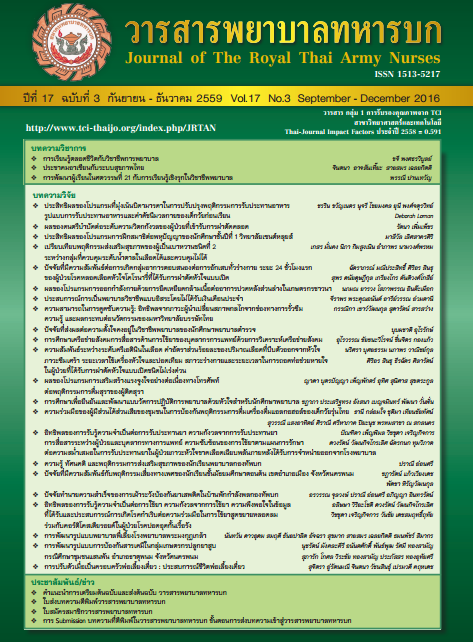การพัฒนารูปแบบพยาบาลพี่เลี้ยงโรงพยาบาลพระมงกุฎเกล้า
Keywords:
การพัฒนา, รูปแบบ, พยาบาลพี่เลี้ยง, The devopment, Model, Nurse’ MentorshipAbstract
การวิจัยและพัฒนาครั้งนี้มีวัตถุประสงค์และขั้นตอนการวิจัยดังนี้ 1) ศึกษารูปแบบพยาบาลพี่เลี้ยงของโรงพยาบาลพระมงกุฎเกล้าโดยศึกษาค้นคว้าข้อมูลจากเอกสารและสนทนากลุ่มผู้เชี่ยวชาญ 2 กลุ่ม ได้แก่ กลุ่มพยาบาลพี่เลี้ยง 10 คน และกลุ่มพยาบาลจบใหม่ 10 คน 2) พัฒนารูปแบบพยาบาลพี่เลี้ยงฯ และ 3) ประเมินรูปแบบ โดยการนำรูปแบบพยาบาลพี่เลี้ยงฯ ไปทดลองใช้กับกลุ่มตัวอย่างพยาบาลพี่เลี้ยง และพยาบาลจบใหม่ จำนวน 20 คนและประเมินผลรูปแบบพยาบาลพี่เลี้ยงฯ ตามแนวคิดของ Kirkpatrick ผลการวิจัยครั้งนี้พบประเด็นสำคัญที่ได้พัฒนารูปแบบพยาบาลพี่เลี้ยงโรงพยาบาลพระมงกุฎเกล้า 4 ด้าน ดังนี้ 1. ด้านนโยบายการใช้รูปแบบพยาบาลพี่เลี้ยง : มีการออกระเบียบ เรื่อง การดูแลพยาบาลปฏิบัติงานใหม่ของหน่วยงานโรงพยาบาลพระมงกุฎเกล้า 2. ด้านคู่มือพยาบาลพี่เลี้ยง : ได้จัดทำคู่มือพยาบาลพี่เลี้ยง เพื่อให้พี่เลี้ยงใช้ประกอบการทำหน้าที่พี่เลี้ยงตามรูปแบบ PMK Mentorship 3. ด้านการอบรมพยาบาลพี่เลี้ยง : มีนโยบายให้ฝ่ายวิชาการและฝ่ายกำลังพล มีหน้าที่รับผิดชอบในการจัดอบรมให้แก่ พยาบาลพี่เลี้ยงทุกปี โดยให้จัดเข้าอยู่ในแผนงบประมาณรายปี 4. ด้านรูปแบบพยาบาลพี่เลี้ยง : รูปแบบพยาบาลพี่เลี้ยงโรงพยาบาลพระมงกุฎเกล้า ประกอบด้วย 3 ขั้นตอน ดังนี้ 1. การเตรียมพยาบาลพี่เลี้ยง 2. การปฏิบัติบทบาทพยาบาลพี่เลี้ยง และ 3. การประเมินผลอย่างเป็นทางการ การประเมินรูปแบบพยาบาลพี่เลี้ยงฯ โดยใช้ แนวคิดของ Kirkpatrick ประเมิน 4 มิติ ดังนี้ 1) ปฏิกิริยาต่อการฝึกอบรม พบว่า ผู้เข้าอบรมมีความพึงพอใจในระดับมาก คือ มีค่าเฉลี่ยตั้งแต่ 3.68 - 4.22 2) ผลสัมฤทธิ์การเรียนรู้ พบว่า คะแนนค่าเฉลี่ยของการเรียนรู้ของพยาบาลพี่เลี้ยงต่อการใช้รูปแบบพยาบาลพี่เลี้ยงฯ 12 สัปดาห์ สูงกว่าก่อนการทดลองใช้รูปแบบพยาบาลพี่เลี้ยงฯอย่างมีนัยสำคัญทางสถิติที่ระดับ .05 สามารถอธิบายได้ว่า ผลสัมฤทธิ์การเรียนรู้นี้ยังคงอยู่ 3) พฤติกรรมการปฏิบัติงาน : หลังการใช้รูปแบบพยาบาลพี่เลี้ยงฯ 24 สัปดาห์เปรียบเทียบหลังการใช้รูปแบบพยาบาลพี่เลี้ยงฯ 12 สัปดาห์ พบว่า คะแนนเฉลี่ยของพฤติกรรมการปฏิบัติหน้าที่ของพยาบาลพี่เลี้ยงด้านการเป็นแหล่งประโยชน์และด้านการเป็นตัวแบบมีค่าคะแนนเฉลี่ยสูงขึ้น อย่างมีนัยสำคัญทางสถิติที่ระดับ .05 ในด้านผลลัพธ์ของการใช้รูปแบบพยาบาลพี่เลี้ยงฯ ประกอบด้วยการประเมิน 2 ด้าน ดังนี้ 1) อัตราการลาออกของพยาบาลใหม่จากสาเหตุความเครียด ความวิตกกังวล ความเบื่อหน่าย และความท้อแท้จากการทำงาน พบว่า ช่วงดำเนินการ ก.พ.-ธ.ค.56 ไม่มีการลาออกจากสาเหตุดังกล่าว 2) สมรรถนะทางคลินิกของพยาบาลจบใหม่ โดยประเมิน 2 ช่วง คือ ช่วงเวลาที่ 12 สัปดาห์และช่วงเวลาที่ 24 สัปดาห์ พบว่าคะแนนค่าเฉลี่ยสมรรถนะทางคลินิกของพยาบาลใหม่ทั้ง 9 ด้านและรวมด้าน ทั้ง 2 ช่วงเวลา สูงขึ้นอย่างมีนัยสำคัญทางสถิติที่ระดับ .05
The Development of Nursing’s Mentorship Model at Phramongkutklao Hospital
The purpose of this study was to develop a nurse’s mentorship model at Phramongkutklao (PMK) Hospital with the following steps: 1) study the nursing mentor model PMK hospital from documents and groups of participants (10 mentors and 10 new novice nurses) 2) Develop nurse’s mentorship model and 3) Evaluate the nurse’s mentorship model by testing the model with the participated mentors and novice nurses using Kirkpatrick Concept. The research findings show that the nurse’s mentorship model at PMK hospital consisted of 4 aspects: 1) Policy aspect of nurse’s mentorship model use: this was done by developing working preparation instruction for novice nurses of PMK hospital and the Academic and Personnel Department took responsibility to arrange the mentorship preparation program. 2) Mentor manual aspect: the manual was produced and given to the mentors to use when performing their duty as PMK Mentorship Model 3) The mentor preparation program aspect: the Academic and Personnel Departments were responsible for making budget plan for the training every year 4) nurse’s mentorship model aspect: this aspect included 3 following steps : 4.1) mentor preparation 4.2) role performance of mentors, and 4.3) formal evaluation based on Kirkpatrick Concept, focusing on 4 aspects : 1) Training response: the training satisfaction was reported at high level (mean = 3.68-4.22) 2) Learning outcomes: the average learning score after implementing nursing mentor model for 12 wks was significantly higher than the Pre-experimental score (p < 0.05), indicating that the learning outcomes still remained. 3) Working behavior: when comparing working behaviors after the nursing model use at 12 and 24 weeks, the working behavior score of the mentors in being useful resources and role model aspects significantly increased (P < 0.05). The outcomes of nurse’s mentorship model use were evaluated in 2 aspects : 1) resignation rate due to stress, anxiety, boredom and being discouraged from work : during the study period (February - December 2014), there was
no resignation among novice nurses due to the causes 2) clinical competency of the novice nurses evaluated at the 2 periods : 12 and 24 weeks. It was found that their average score of clinical competency in all 9 aspects and in total at both periods significantly increased (P < 0.05).
Downloads
Downloads
How to Cite
Issue
Section
License
บทความหรือข้อคิดเห็นใดใดที่ปรากฏในวารสารพยาบาลทหารบกเป็นวรรณกรรมของผู้เขียน ซึ่งบรรณาธิการหรือสมาคมพยาบาลทหารบก ไม่จำเป็นต้องเห็นด้วย
บทความที่ได้รับการตีพิมพ์เป็นลิขสิทธิ์ของวารสารพยาบาลทหารบก
The ideas and opinions expressed in the Journal of The Royal Thai Army Nurses are those of the authors and not necessarily those
of the editor or Royal Thai Army Nurses Association.






